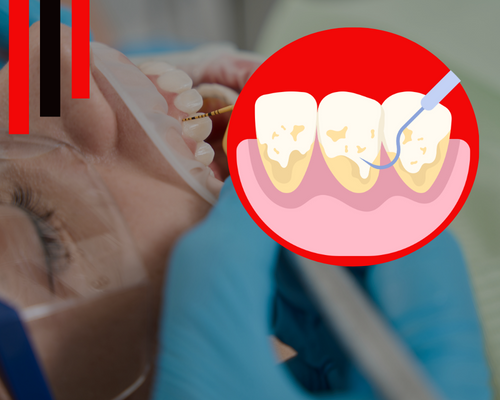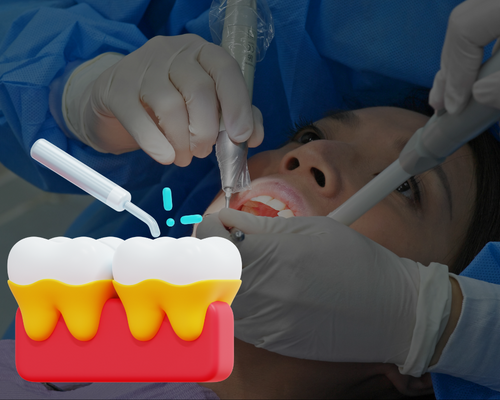Welcome to our blog post on the best ultrasonic scaling treatment in Kolkata! If you’re looking for a professional and effective way to maintain your oral health, then you’ve come to the right place. In this article, we will explore everything you need to know about ultrasonic scaling treatment, its benefits, costs, and more. So sit back, relax, and let’s dive into the world of dental care like never before! Whether you are dealing with plaque build up or want that sparkling smile restored, we’ve got you covered. Let’s get started!
Scaling and Polishing of Teeth Price
In Kolkata, the cost for scaling and polishing of teeth typically ranges from INR 500 to INR 2000 per session. However, it’s important to note that this is just a general estimate and prices may vary from one clinic to another. Some clinics also offer package deals where you can get multiple sessions at a discounted rate.
Price for Scaling Teeth
The price for scaling teeth can vary depending on several factors, including the location of the dental clinic and the severity of your condition. In Kolkata, you can expect to pay a reasonable fee for this treatment. However, keep in mind that prices may differ from one clinic to another.
Laser Scaling of Teeth Cost in India
In terms of cost, laser scaling may be slightly higher than traditional scaling methods due to the advanced technology involved. However, considering the long-term benefits and improved oral health outcomes, many people find it to be a worthwhile investment. It’s important to note that the exact cost of laser scaling may vary depending on factors such as the dentist’s expertise, location, and extent of treatment required. It’s best to consult with a trusted dental professional who can provide an accurate assessment and discuss pricing options
Scaling of Teeth Cost Near Me
The price of scaling teeth can vary depending on various factors such as the location, dental clinic, and the expertise of the dentist. It’s always a good idea to research and compare prices before making a decision. When it comes to finding out the cost of scaling teeth near me, it’s important to keep in mind that different dental clinics may have different pricing structures. Some clinics may charge per tooth or per quadrant, while others may have a flat fee for scaling and polishing.
To get an accurate estimate of the cost, it is recommended to contact your local dental clinics directly or visit their websites to inquire about their pricing details. They will be able to provide you with specific information based on your needs.
Teeth Cleaning Charges
In general, teeth cleaning charges in Kolkata are quite affordable compared to other cities in India. The cost typically ranges from 500 to 2000 INR per session. It’s important to note that this price may differ based on individual clinics and their specific pricing policies.
Is Ultrasonic Scaling Better?

One advantage of ultrasonic scaling is its ability to reach areas that are difficult to access with manual instruments. The ultrasonic scaler uses high-frequency vibrations to break down and remove calculus, making it easier for dentists to thoroughly clean your teeth. Another benefit is that the procedure is generally less painful and more comfortable for patients. The ultrasonic scaler gently vibrates against the tooth surface, reducing discomfort compared to scraping with a metal instrument. Additionally, ultrasonic scaling can be faster than traditional methods, allowing for shorter appointment times. This means less time spent in the dental chair and more convenience for patients. Moreover, studies have shown that ultrasonic scalers may reduce damage to tooth enamel compared to manual scraping techniques. This makes it a safer option for those concerned about preserving their natural teeth.
There are several advantages associated with ultrasonic scaling treatment. Its ability to reach difficult areas, reduced discomfort during the procedure, shorter appointment times, and potentially less damage to tooth enamel all contribute to its effectiveness as a dental cleaning method. It’s no wonder why many people consider this modern approach superior when it comes to maintaining optimal oral health!
What are the 2 Types of Ultrasonic Scalers?
There are two types of ultrasonic scalers that are commonly used in dental practice:
1. Magnetostrictive Ultrasonic Scalers: This type of scaler uses a stack of metal strips which vibrate when an electric current is passed through them. The vibrations created by these metal strips help in breaking down the calculus or tartar on the teeth.
2. Piezoelectric Ultrasonic Scalers: Unlike magnetostrictive scalers, piezoelectric scalers use ceramic discs or crystals to generate vibrations when an electric current is applied to them. These vibrations are then transmitted through the scaler tip to remove plaque and tartar from teeth.
What are the Risks of Ultrasonic Scaling?
One possible risk is tissue damage. The high-frequency vibrations produced by the ultrasonic scaler can generate heat, which may cause injury to the soft tissues in your mouth if not used properly. However, skilled dental professionals know how to control the intensity and duration of the treatment to minimize this risk. Another concern is tooth sensitivity. Some individuals may experience temporary tooth sensitivity after undergoing ultrasonic scaling. This typically occurs because the procedure removes plaque and tartar buildup from sensitive areas of your teeth, exposing them to temperature changes and other stimuli. In rare cases, there have been reports of enamel damage or cracks in teeth following ultrasonic scaling. Again, this risk can be minimized by ensuring that only trained professionals use these devices with proper techniques. For patients with certain medical conditions like heart disease or pacemakers, caution should be exercised when using an ultrasonic scaler as it has been known to interfere with electronic medical devices
Can Ultrasonic Scaler Crack Teeth?

It’s important to note that these incidents are not common, and most dental professionals are skilled at using the ultrasonic scaler without causing any damage. In fact, many patients prefer this method of cleaning because it is efficient and less uncomfortable than manual scaling. To minimize the risk of tooth damage during ultrasonic scaling, dentists take certain precautions. They carefully assess each patient’s oral health before proceeding with treatment. If a tooth is already weakened or compromised, alternative methods may be recommended to avoid further damage. In addition, dental professionals undergo extensive training to ensure they have the skill and knowledge necessary to operate an ultrasonic scaler safely. They know how much pressure to apply and when to adjust settings based on individual patient needs.
If you have concerns about potential tooth cracking during an ultrasonic scaling treatment, it’s best to discuss them with your dentist beforehand. They can provide reassurance and address any specific concerns you may have based on your unique oral health situation.
What is the Disadvantage of Using Sonic Scaler?
One major drawback is that they tend to generate more heat, which can cause discomfort or even damage to the surrounding tissues if not used properly. Additionally, sonic scalers may be less effective in removing stubborn tartar deposits compared to their ultrasonic counterparts. Another disadvantage is the noise produced by sonic scalers. The high-frequency vibrations they create can be quite loud and unsettling for some patients, causing anxiety or uneasiness during the procedure. Furthermore, sonic scalers are bulkier and heavier than ultrasonic scalers, making them less maneuverable and potentially more tiring for the dentist or hygienist performing the treatment. While both types of scaler are generally safe when used correctly, there is a slightly higher risk of tooth surface irregularities or enamel micro-cracks occurring with sonic scaling due to its mechanical action.
How Do I Choose a Good Ultrasonic Cleaner?
When it comes to choosing a good ultrasonic cleaner, there are a few factors that you should consider. You’ll want to look at the frequency and power output of the cleaner. Higher frequencies generally provide better cleaning results, so aim for cleaners with frequencies between 40kHz and 45kHz. Next, take into account the tank size of the ultrasonic cleaner. The size of the tank will determine how many items can be cleaned at once. If you’re looking to clean larger items or multiple items simultaneously, opt for a bigger tank capacity. The material of the tank is also important. Stainless steel tanks are more durable and resistant to corrosion compared to plastic tanks.
Consider whether your chosen ultrasonic cleaner has adjustable settings such as temperature control and timer features. This allows you to customize the cleaning process according to your specific needs. It’s also worth checking if the manufacturer provides good customer support or warranty options in case any issues arise with your ultrasonic cleaner.
FAQs:
Q: Is Ultrasonic Scaling Better than Traditional Scaling Methods?
A: Ultrasonic scaling is a highly effective and efficient method for removing plaque, tartar, and stains from teeth. It uses high-frequency vibrations to break down the buildup on the tooth’s surface. This technique is often preferred over traditional hand-scaling because it requires less time and effort
Q: What are the Risks of Ultrasonic Scaling?
A: While ultrasonic scaling is generally safe, there are some potential risks involved. The most common side effects include sensitivity or discomfort during and after the procedure. In rare cases, the vibrations may cause tooth or gum damage if used improperly by an inexperienced practitioner
Q: Can an Ultrasonic Scaler Crack Teeth?
A: When used correctly by a skilled dental professional, an ultrasonic scaler should not crack teeth. However, if excessive pressure or improper technique is used during the procedure, it can potentially lead to cracks in weakened or compromised teeth.
Q: What is the Disadvantage of Using a Sonic Scaler?
A: One disadvantage of using a sonic scaler is that it generates more heat compared to its counterpart, which could cause discomfort for patients with sensitive teeth. Additionally, sonic scalers tend to be larger and bulkier than their counterparts, making them slightly more difficult to maneuver in certain areas of the mouth.
Conclusion
If you are looking for the best ultrasonic scaling treatment in Kolkata, there are several factors to consider. While cost is an important aspect, it should not be the sole determining factor. It is essential to find a dental clinic that offers high-quality services and has experienced professionals who can provide effective ultrasonic scaling treatment. Ultrasonic scaling has revolutionized dental hygiene procedures by offering a more efficient and comfortable cleaning experience. With its ability to remove tartar and plaque effectively, it helps maintain good oral health and prevents various dental problems like gum disease. When choosing an ultrasonic scaler, look for one that offers adjustable power settings and different tips suitable for specific needs. Additionally, consider factors such as durability, ease of use, and maintenance requirements.
Remember to consult with your dentist regularly for professional advice on maintaining optimal oral health. They will guide you on whether ultrasonic scaling is the right treatment option for you based on your specific condition.
So why wait? Take advantage of the benefits offered by ultrasonic scaling treatment today! Schedule an appointment with Smile signature dental clinic in Kolkata that offers this advanced dental procedure. Your smile deserves nothing but the best care!
